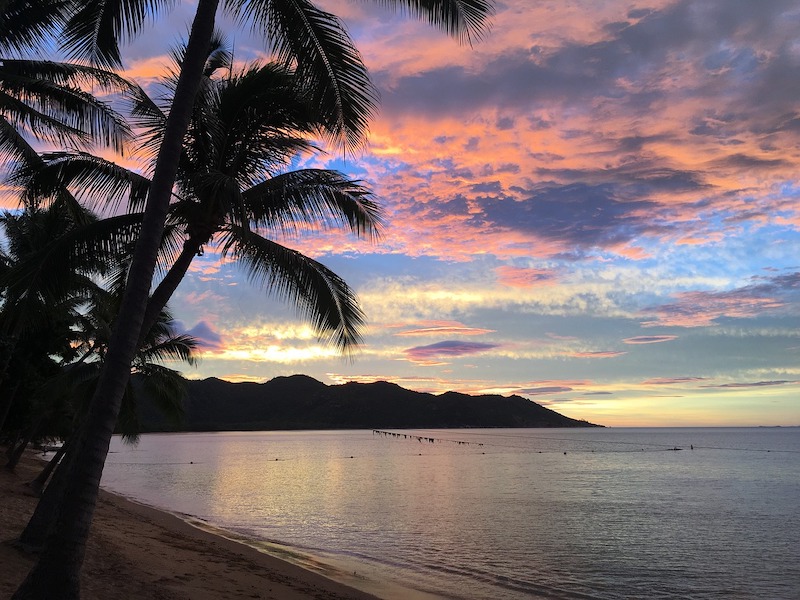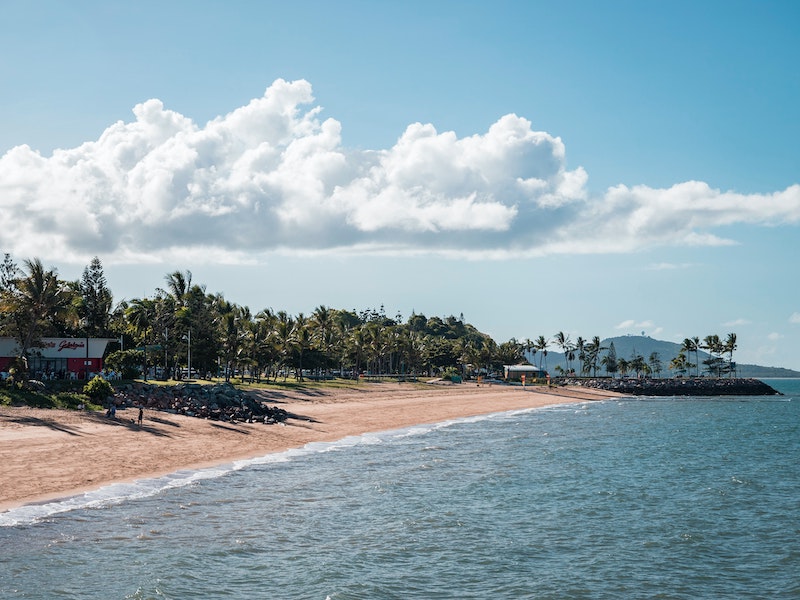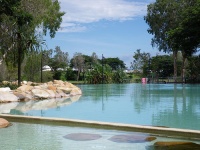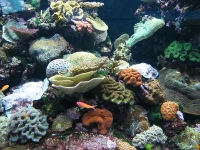City guides


Townsville Travel Guide
With a magnetic charm and dozens of fabulous attractions and golden sandy beaches, this laid-back little town oozes with character and takes pride in being the unofficial capital of Queensland. Townsville is located on the shores of Cleveland Bay and with views of the picturesque and idyllic Magnetic Island in the distance it's not hard to see why people are so strongly drawn here.
Townsville played an active role in World War II, when American and Australian troops were stationed here during the Pacific campaign. Japanese bombs were even dropped in the harbour in 1942, but thankfully there was very little damage to the coastal city. Today an army of local and international tourists visit, drawn to the year-round good weather and varied attractions to suit any inclination.
Visitors can take a trip to the magnificent Magnetic Island to explore the National Park, or take the plunge and do some reef diving to discover the famous Yongala Wreck or Great Barrier Reef to the east. Back on land, they can go on a 4x4 trip into the Outback to the west, marvel at the magnificently verdant tropical rainforests dotted with waterfalls to the north, or visit the mango and sugar cane farms to the south.
With numerous restaurants and bars, wonderful shopping opportunities and a quiet cosmopolitan feel, Townsville has something for everyone, though it should be noted that saltwater crocodiles are present in all swimming locations here, including the beach, so caution should be exercised in the water.
Things to do in Townsville
Townsville is one of Queensland's best loved holiday destinations and boasts numerous attractions and activities for tourists.
Those interested in the WWII history of the city, and all things military, should visit the Army Museum of North Queensland. Animal lovers shouldn't miss a visit to the Billabong Sanctuary to meet some of the unique Australian wildlife. The Museum of Tropical Queensland, which is interactive and state-of-the-art, tells the tale of the maritime history of the region, as well as detailing the natural and human history of tropical Queensland. The whole family will enjoy Reef HQ, a huge aquarium, and the neighbouring Cultural Centre, which documents the history and culture of the Aboriginal peoples of the region.
Those who seek out heights will enjoy a hike up the magnificent Castle Hill, which looms above Townsville and provides spectacular views. Magnetic Island can clearly be seen from the granite outcrop, situated nearly five miles (8km) away, and the island is a very popular excursion from the city. Half of the island is covered by the National Park of the same name, a haven for nature lovers.

Magnetic Island
Magnetic Island was named by Captain James Cook in 1770, when he believed that the landmass of the island affected the magnetic compass on his ship, 'Endeavour'. More than half of the island, which is about five miles (8km) from Townsville, is a National Park known for its rugged landscape of granite boulders, hoop pines and eucalyptus trees. The island has 23 beaches and bays, some of which can only be reached on foot. There are more than 12 miles (20km) of walking trails marked out on the island. Part of the Great Barrier Reef Marine Park fringes the island, which is also home to the most northerly colony of free-ranging koala bears in Australia.
The island offers a range of massage treatments and there are two regular markets for visitors to enjoy. Visitors will also find a diverse and vibrant community of artists, whose works are inspired by the natural beauty and history of Magnetic island. Art lovers can shop and admire local art just metres from the beach, or visit some of the intimate local galleries. A wide range of accommodation and transport is available.

The Strand
This 1.3-mile (2.2km) long tropical beach and palm tree-dotted promenade is one of Townsville's most popular attractions. Visitors can take a leisurely stroll, enjoy the scenery from their bicycles, take a dip at one of the safe swimming beaches, or enjoy a picnic overlooking the ocean at one of the many designated picnic areas in the gardens. Families travelling with their children in tow can visit the nearby water park, while the trendy restaurants and bars that line the strip make a wonderfully romantic and picturesque setting at any time of day, with views stretching out over to Magnetic Island. The fourth Friday of each month also sees Strand Park used for night markets, which are great places to pick up some unique souvenirs in Australia, such as Aboriginal arts and crafts, and boomerangs.

Riverway
This beautiful riverfront parkland stretches along nearly seven miles (11km) of the Ross River, with nodes at Pioneer Park, Loam Island, Apex Park and the Ross River Dam. The Riverway has fast become one of Townsville's most popular tourist attractions. Pioneer Park is the activity hub where visitors can enjoy sport, entertainment, performing arts, visual arts, swimming in the two huge lagoons, dining and shopping at the village precinct, and even picnicking and barbecuing along the picturesque shores of the Ross River. There is something to amuse and delight people of all ages, making the Riverway popular with locals and tourists alike.

Reef HQ Aquarium
One of the largest living coral reef aquarium in the world, the Reef HQ Aquarium was built as part of the Great Barrier Reef Marine Park Authority. Featuring 130 species of coral, 120 species of fish and plenty of star fish, sea urchins, sponges and sea cucumbers, Reef HQ also features a predator exhibit, a children's section, a gift shop and a cafe to provide refreshments. A trip to the Reef HQ Aquarium is a must for all visitors who plan on taking a dive at the Great Barrier Reef, as they'll learn more about the species of marine life they might encounter while exploring the miraculous underwater world. The Aquarium is a great attraction for families in Townsville, especially on a rainy day.
Getting Around
Townsville's public transport system incorporates bus services operated by Sunbus, which provides regular and efficient services between major points throughout the city. Taxis can generally be found outside major hotels and tourist sites, are easily hailed on the street, and usually operate 24 hours a day throughout the metropolitan area. Ferries and water taxis operate regularly to Magnetic Island and Palm Island. Car rental agencies can be found in the city and travellers planning on exploring further afield should opt for a rental car, which is the most convenient option when exploring the wider region.
Townsville Climate and Weather
With around 3,000 hours of sunshine a year Townsville experiences a tropical savannah climate. Its rainfall is not nearly as high as other tropical regions such as Cairns, with the majority of the rain falling in the 'wet season', which runs from November through April. Winters are mild and pleasant, moderated by southeasterly trade winds and far from cold. July is the coldest month of winter, with average daily temperatures still reaching 77F (25C). The summer months are warm and December is the hottest month, with daytime temperatures soaring to 88F (31C). Townsville is prone to tropical cyclones between November and May which form mainly over the Coral Sea.
Australia travel info
Electricity
Electrical current is 230 volts, 50Hz. Three-pin flat blade plugs are used but are different to those in most other countries, so an adapter is normally required.
Language
English is the official language of Australia.
Money
The unit of currency is the Australian dollar (AUD), which is divided into 100 cents. Credit cards are widely accepted and ATMs are freely available throughout the country. Banks and bureaux de change exchange most foreign currencies. Banking hours are generally 9.30am to 4pm, Monday to Thursday, and 9.30am to 5pm on Friday, but some banks offer extended hours and some are open on Saturday mornings.
Tipping
Most service providers in Sydney don't expect a tip, so travellers shouldn't feel pressured into giving one. A tip of 10 percent is standard in restaurants, however, and passengers usually round up to the nearest dollar or more in taxis.
Health
A yellow fever vaccination certificate is required by travellers over one year of age arriving within six days of having stayed overnight or longer in an infected country. No other special immunisations or medications are required for most trips to Australia; however, insect repellents are strongly advised because of the risk of mosquito-borne illnesses. Another health risk is sunburn, and visitors are advised to take precautions. Medical services are excellent but can be expensive, so travellers should ensure that they have adequate insurance. Australia has a reciprocal health agreement with the United Kingdom providing for free hospital emergency medical treatment; proof of UK residence is required.
Safety
The crime rate in Australia is low; however, travellers should be aware that tourists could be targeted by petty criminals. Visitors should be vigilant about personal possessions and travel documents, particularly in popular tourist destinations such as along the Gold Coast. Tropical cyclones normally occur between November and April in some parts of Australia, particularly in Western Australia, Queensland and the Northern Territory. There is a serious risk of bush fires in summer (November to March), especially in Victoria, Tasmania, New South Wales and ACT. Also during the summer months, the shallow coastal waters of northern Australia and Queensland become infested with marine stingers, commonly known as box jellyfish, whose sting is highly dangerous and can be deadly. Visitors should pay attention to signs on beaches and follow the instructions of local lifeguards to avoid injury.
Local customs
Generally an informal attitude, in dress and behaviour, prevails in most social and business situations. Sport, particularly rugby and cricket, is almost a religion in Australia.
Doing business
Those doing business in Australia are sure to find that the friendly yet professional corporate atmosphere of the country will provide them with an exciting opportunity to develop their careers. The business culture of Australia is a bit of a hybrid breed, incorporating the trappings of British formality and conservatism, the egalitarian ethos of Scandinavian countries, and the dynamic, innovative approach to business that is generally thought of as American in origin - rounded out, of course, with typical Australian warmth and humour. The approach to management in Australia is consultative, pragmatic, and strictly non-hierarchical. Those in positions of relative power are accorded respect by virtue of their personal qualities, not simply because they happen to be the boss.
Business etiquette in Australia further reflects this egalitarian ethos. Business people should use titles initially, though they will almost certainly be told to dispense with them and refer to their colleagues by their first names. They should maintain eye contact when speaking to their associates, as this is regarded as a sign of forthrightness and trustworthiness, qualities that Australian business people tend to favour over showiness, self-aggrandisement or empty promises. Business meetings in Australia should be scheduled about a week in advance, and then confirmed a few days before they are due to take place.
Colleagues should be punctual, as lateness can be seen as a symptom of flakiness or indifference. Business meetings in Australia do not generally proceed from a set agenda. Rather, they are viewed as open forums, in which ideas are to be debated and discussed. In fact, over-preparing for a meeting can make participants seem pushy, as though they wish to bully others into adopting their opinions on the issue at hand. The dress code for business in Australia remains surprisingly traditional: dark suits and ties are the norm for men; for women, business suits, worn either with pants or a skirt. As a general rule, business people should avoid loud jewellery and accessories, as to Australian eyes they might make them seem arrogant. The official language of business in Australia is English, and business hours are generally from 8.30am (or 9am) to 5pm (or 5.30pm), Monday to Friday.
Duty free
Travellers to Australia over 18 years do not have to pay customs duty on 2.25 litres of alcohol; and 25 cigarettes or 25g of cigars or tobacco products. All tobacco products in travellers' baggage are included in this category, regardless of where they were purchased. Gifts are included in the A$900 duty-free allowance. Fresh produce and animal or plant products are prohibited.
Communications
The international dialling code for Australia is +61. Hotels, cafes and restaurants offering free WiFi are widely available; purchasing a local prepaid SIM card can be a cheaper option than paying international roaming costs, which can be quite high.
Passport & Visa
A valid passport and a visa or ETA is required for travel to Australia. An ETA is an electronically issued and verified visa, not visible in a passport. ETAs are issued to passengers travelling for touristic or business purposes. Tourist ETAs are usually valid for three months. ETAs are obtainable online at: www.eta.immi.gov.au or through most travel agents. It is highly recommended that passports are valid six months after departure from a holiday destination.
Entry requirements
US nationals must have a valid passport on arrival. A pre-obtained Electronic Travel Authority (ETA) is required for stays of up to three months.
UK nationals must have a passport valid for intended period of stay. A pre-arranged Electronic Travel Authority (ETA) is required for stays of up to three months.
Canadian nationals require a passport valid for intended period of stay. A pre-arranged Electronic Travel Authority (ETA) is required for stays of up to three months.
South African nationals must have a passport valid for at least six months after their date of departure. A visa is required.
Irish nationals must have a passport that is valid on arrival. A pre-arranged Electronic Travel Authority (ETA) is required for stays up to three months.
New Zealanders require a valid passport on entry to Australia. A Special Category Visa (SCV) is issued on arrival after completing a passenger card.
Useful contacts
Australian Tourist Commission, Sydney: +61 (0)2 9360 1111 or www.australia.com
Emergencies: 000 (112 on cellphones)Embassies / consulates in other countries
Embassy of Australia, Washington DC, United States: +1 202 797 3000.
Australian High Commission, London, United Kingdom: +44 (0)20 7379 4334.
Australian High Commission, Ottawa, Canada: +1 613 236 0841.
Australian High Commission, Pretoria, South Africa: +27 (0)12 423 6000.
Australian Embassy, Dublin, Ireland: +353 (0)1 664 5300.
Australian High Commission, Wellington, New Zealand: +64 (0)4 473 6411.
Embassies / consulates in Australia
Embassy of the United States, Canberra: +61 (0)2 6214 5600.
British High Commission, Canberra: +61 (0)2 6270 6666.
Canadian High Commission, Canberra: +61 (0)2 6270 4000.
South African High Commission, Canberra: +61 (0)2 6272 7300.
Embassy of Ireland, Canberra: +61 (0)2 6214 0000.
New Zealand High Commission, Canberra: +61 (0)2 6270 4211.


